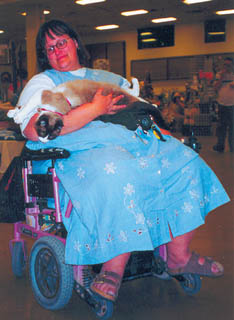Sue Lee, 45, from Wolverhamton, England, is pretty much homebound due to a variety of disabling conditions: severe osteoarthritis, insulin-dependent diabetes and peripheral neuropathy in both feet and legs. She has constant pain in almost all her joints and finds it difficult to hold most everyday objects.

234
She uses crutches around the house and an electric scooter when she goes outside. Her husband is her primary caretaker. And yet she is a proud and loving companion to five cats. I love playing with them and watching them play. Three of them sit on my lap regularly and [get a lot of] fuss from me.
Studies have shown how much cats and other animals can enhance the lives of people with special needs by providing companionship and unconditional love, giving them a purpose and motivating them to stay as active as possible.
The question is: Can people with physical disabilities take care of their cats? While they may need assistance from others, many people with special needs can more than adequately care for their cats, says Leslie Appel, DVM, executive director of Shelter Outreach Services in Ithaca, New York and former director of Cornell Companions – a pet visitation program. And when they take care of their cats, they are more likely to take care of themselves. For example, she says, When a special-needs person feeds her cat dinner, she will remember to get herself something to eat, also.
If you have a physical disability or know someone who does, the following guidelines will help with caring for a cat:
What Type of Cat is Best?
The best kind of cat to get is a short-haired breed. If you have arthritis and have trouble moving your hands, says Dr. Appel, its hard to keep a cat groomed. Long-haired cats will be much more troublesome.
Plan to keep your cat indoors. This gives you more control over your cats safety. If you have trouble getting around, it will be hard to let your cat in and out all day – or go searching for your cat if he wanders off.
Is it better to start with a kitten or get an adult cat? Either can work out well, says Dr. Appel. If youre going to get a kitten, get two at the same time. They will entertain each other and take some pressure off a person with special needs. Then again, says Dr. Appel, there are beautiful adult cats at shelters who are wonderful for people with physical limitations to adopt because older cats are through their initial wild stage and make calmer companions.
Making Feeding Easier
I cant feed my cats tinned food, says Sue Lee, because I cant get the tins open. My husband does that. But I do feed them dry food and cat treats every day.
If feeding your cat is a concern because you cant open canned food, dont worry.
Feeding high quality dry food is absolutely adequate. Canned food is not necessary, says Dr. Appel. If you cant bend down to put the cats water and food dishes on the floor, place them on a counter. Your cat will very quickly learn where his food is. If it is too difficult for the cat to get up to the counter (especially young kittens and senior cats), set out a chair in front of the counter so the cat can use it to jump up to his food and water dishes. Some people with physical problems may have trouble replenishing a cats daily water supply. You can buy electric fountains from a pet supply store that will make it easier.
Help with the Litter Box
This is where a person with special needs will have to ask for help from partners, friends and family. Sometimes there are local pet support groups (call your local shelter) that volunteer to help with the litter box or other more difficult tasks. One alternative is to try an electric litter box. With these devices, you change the litter much less frequently than with regular litter boxes. Check with your pet supply store.
Keep up the Grooming
Besides being good for your cat, brushing her can give the two of you pleasure and an opportunity to bond. The problem is that people with limited dexterity often cant manage a really good grooming session. I can groom my cats with a brush, says Susan Lee, but find I cannot hold a comb to groom them. Since a comb is the best way to remove knots and tangles, enlist the help of other people in your home or make sure that the cats gets groomed regularly by a professional.
Do cats notice the difference between a person with special physical needs and people who dont have those needs? Cats are amazing, says Dr. Appel. Ive witnessed how cats seem to sense that something is different about someone and will accommodate that person, focus on them, and act more gentle or affectionate. Of course, they will love that person the same as anyone else.



